Are you looking for a simple yet powerful way to elevate your beauty and wellness routine? Rosemary water might just be the answer! Known for its earthy aroma and numerous health benefits, this herb has been cherished for centuries. From promoting hair growth to enhancing skin health, rosemary water is a natural remedy you can make right at home. In this article, we’ll walk you through the ultimate rosemary water recipe, explore its benefits, and share tips to incorporate it into your daily life. Let’s dive in!
Table of Contents
1. What is Rosemary Water?
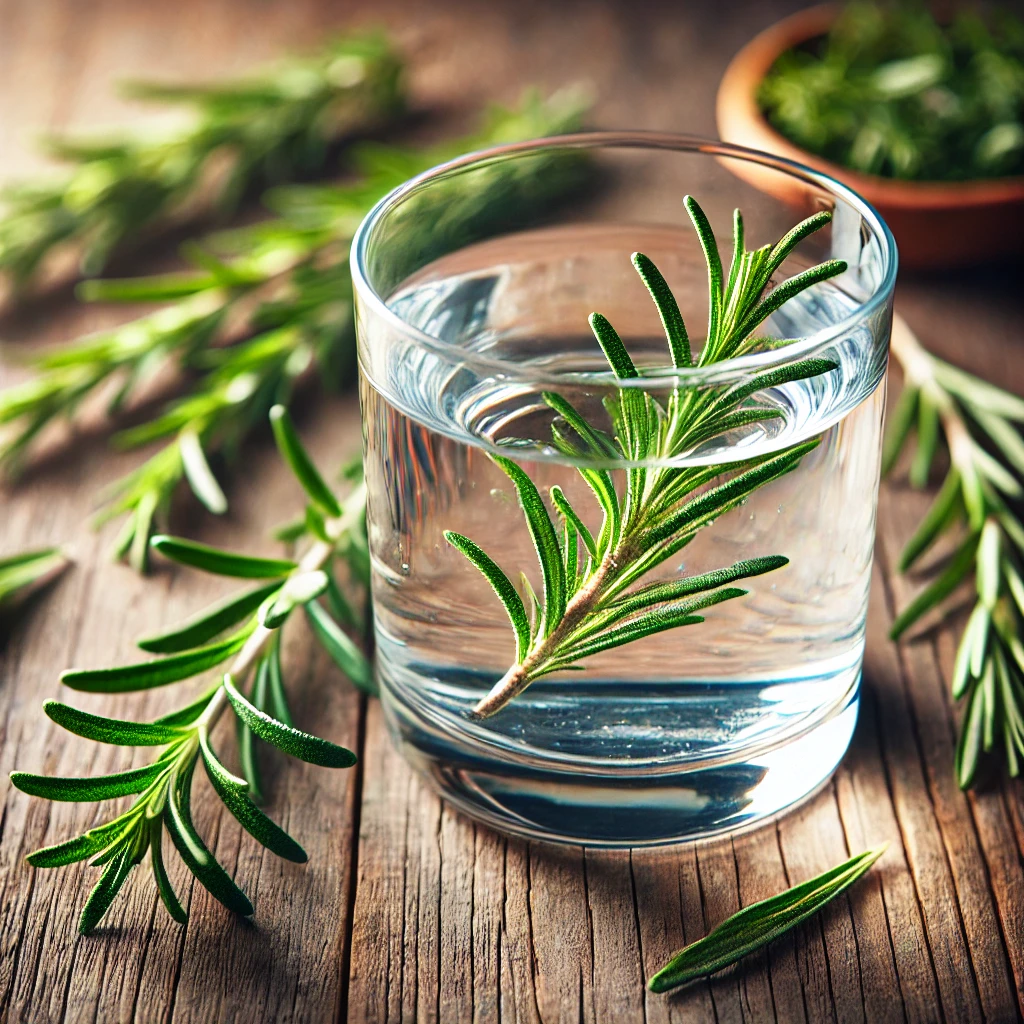
Rosemary water is a natural infusion made by steeping rosemary leaves in water, creating a fragrant and nutrient-rich liquid. This simple yet powerful preparation has its roots in traditional herbal medicine, where rosemary has been used for centuries as a remedy for various ailments and a beauty enhancer. Known for its distinctive earthy aroma and robust flavor, rosemary water is as versatile as it is beneficial.
Think of rosemary water as a gentle elixir that brings the essence of this herb into a form you can use in multiple ways. Whether you’re rinsing your hair, spritzing it on your skin, or sipping it as a refreshing beverage, rosemary water is an easy and natural way to tap into the power of plants. Plus, it’s incredibly simple to make at home with just a handful of rosemary sprigs and some water.
This herb is much more than just a culinary staple for spicing up dishes. Its essential oils, antioxidants, and anti-inflammatory properties make rosemary water a sought-after remedy for health and beauty enthusiasts alike. Whether you’re looking to stimulate hair growth, brighten your skin, or simply enjoy its calming scent, rosemary water is a natural solution worth trying.
2. Benefits of Rosemary Water
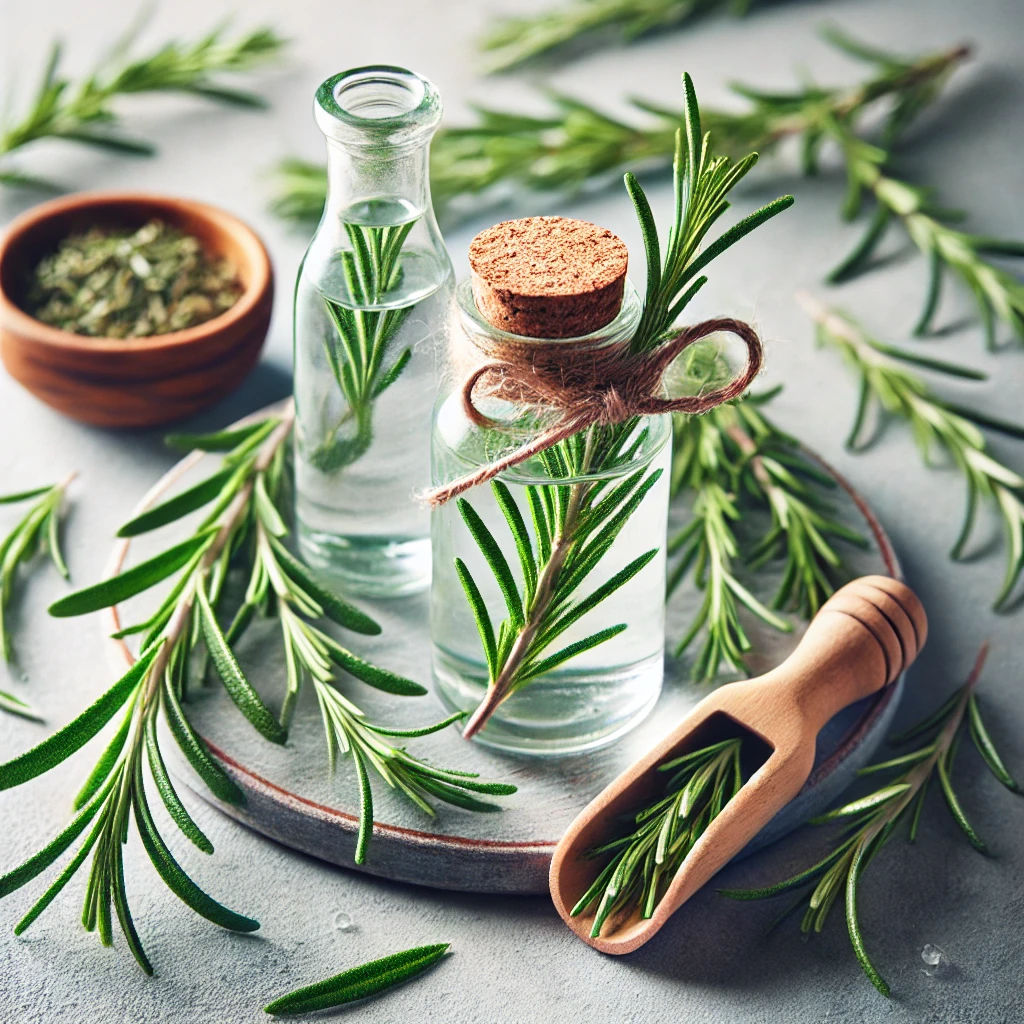
Why is rosemary water gaining popularity in the beauty and wellness world? Its benefits are numerous, spanning from hair care to overall well-being. Here are some of the top advantages of incorporating rosemary water into your routine:
a. Boosts Hair Growth and Reduces Hair Loss
Rosemary water is a natural tonic for hair health. It works by stimulating blood circulation to the scalp, which encourages hair follicles to grow stronger and thicker. Many people use it as a rinse or spray to combat hair thinning and promote healthier, shinier locks.
b. Enhances Skin Health
Packed with antioxidants, rosemary water fights free radicals that contribute to skin aging. It can help reduce inflammation, tighten pores, and give your skin a radiant glow when used as a toner or facial mist.
c. Improves Mental Clarity
Ever noticed how the scent of rosemary instantly makes you feel more alert? That’s because it stimulates your brain. Inhaling its aroma can improve focus, reduce stress, and even boost your mood.
d. Supports Digestive Health
When consumed, rosemary water can act as a gentle digestive aid. It helps reduce bloating, soothes an upset stomach, and promotes a healthy gut.
e. Promotes Relaxation
The calming properties of rosemary make its water an excellent choice for aromatherapy. Mist it around your space to create a serene atmosphere or spritz it onto your pillow for a restful night’s sleep.
f. Antimicrobial and Anti-inflammatory Effects
Rosemary water is naturally antimicrobial, making it an effective solution for acne-prone skin or minor cuts. Its anti-inflammatory properties also help reduce redness and irritation.
Whether you’re seeking a natural remedy for hair, skin, or overall well-being, rosemary water is a simple yet effective solution. With so many benefits packed into this herbal infusion, it’s no wonder that it has become a favorite for those looking to embrace a natural lifestyle.
3. Ingredients You’ll Need
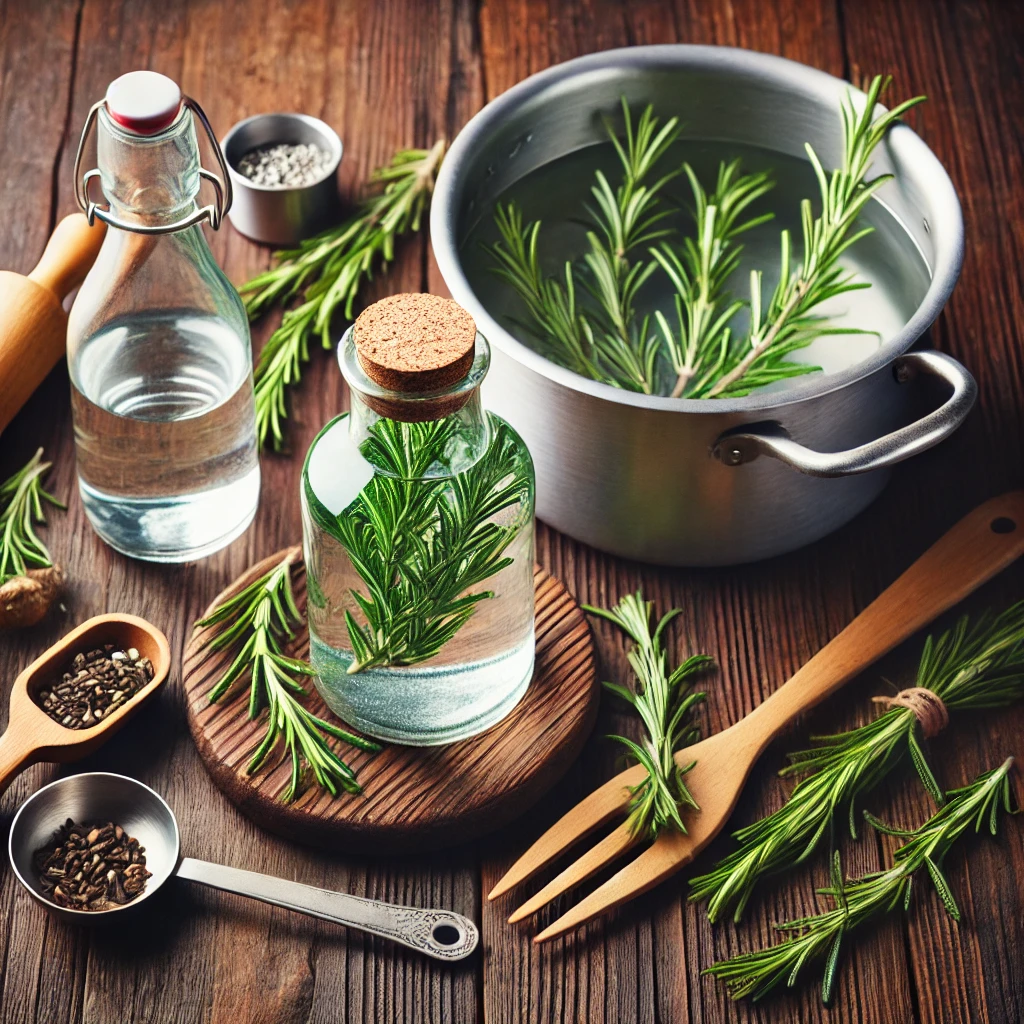
Creating rosemary water at home is incredibly straightforward, and you only need a handful of ingredients that are likely already in your kitchen or easily available. Here’s what you’ll need:
- Fresh or Dried Rosemary Sprigs: Fresh sprigs are ideal because they retain the herb’s essential oils, but dried rosemary is a great alternative.
- Filtered Water: Using filtered water ensures a pure and clean infusion, free from impurities or chlorine that may affect the quality.
- Optional Additions: Depending on your preference, you can enhance your rosemary water with ingredients like lavender, mint leaves, or essential oils for extra benefits and fragrance.
4. Step-by-Step Rosemary Water Recipe
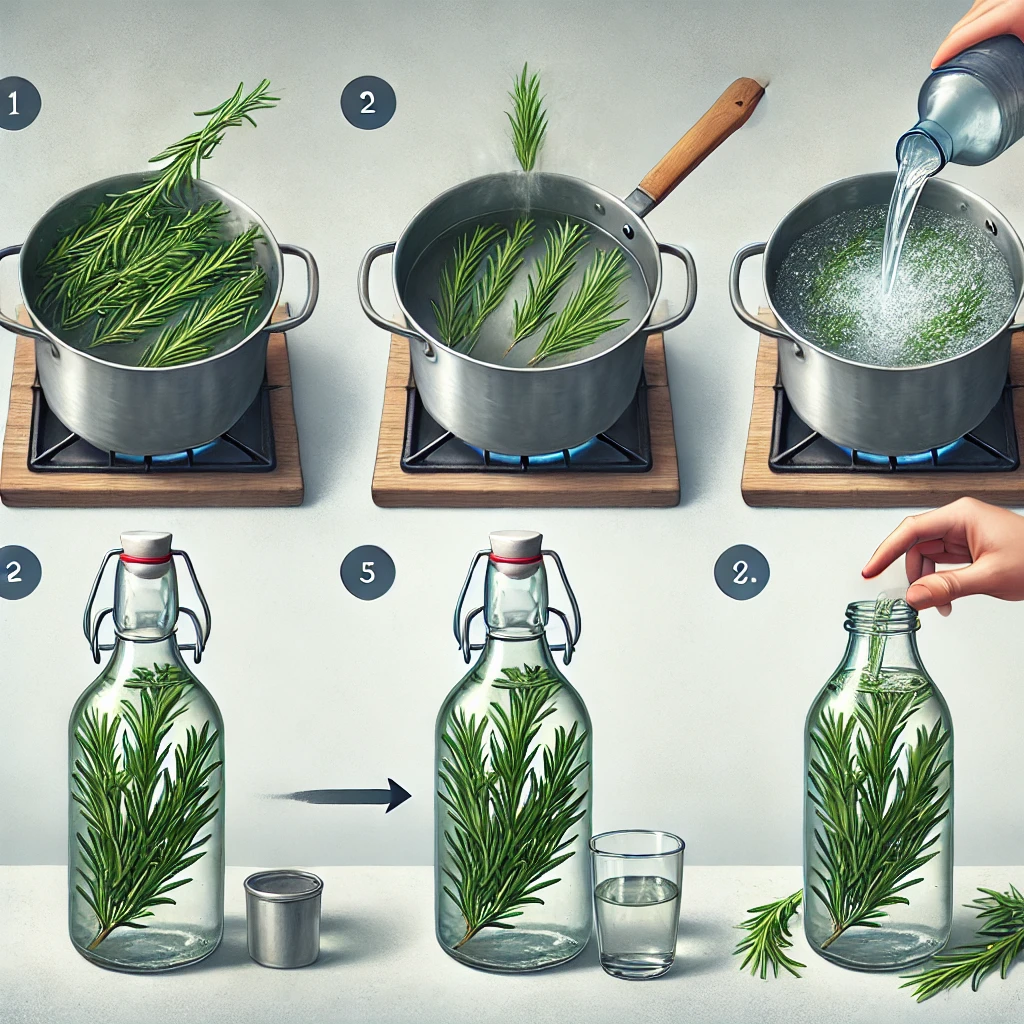
Making rosemary water is as easy as boiling water for tea. Here’s a detailed guide to help you get it right every time:
Step 1: Gather Your Ingredients
Start with about five fresh rosemary sprigs or two tablespoons of dried rosemary. Ensure the rosemary is clean and free from any dirt or debris.
Step 2: Boil the Water
Bring four cups of filtered water to a gentle boil in a medium-sized pot.
Step 3: Add the Rosemary
Once the water is boiling, reduce the heat to a simmer and add the rosemary sprigs or dried rosemary to the pot.
Step 4: Let it Steep
Allow the rosemary to simmer for about 15-20 minutes. This gives the water enough time to absorb the herb’s oils and nutrients.
Step 5: Cool and Strain
Turn off the heat and let the rosemary water cool completely. Strain the liquid using a fine-mesh sieve or cheesecloth to remove the rosemary bits.
Step 6: Store Properly
Transfer the rosemary water into a clean, airtight glass container or spray bottle. Store it in the refrigerator for up to 7-10 days.
5. Tips for Storing Rosemary Water

Proper storage is key to ensuring your rosemary water stays fresh and effective. Here are some tips:
- Sterilize Your Container: Wash the container with hot, soapy water and rinse thoroughly before filling it with rosemary water.
- Label the Bottle: Mark the date you made the infusion to keep track of its freshness.
- Avoid Room Temperature Storage: Always refrigerate rosemary water to prevent bacterial growth.
- Freeze for Longevity: If you’ve made a large batch, pour some into an ice cube tray and freeze it. Thaw cubes as needed for a refreshing, ready-to-use supply.
6. How to Use Rosemary Water

Rosemary water is wonderfully versatile and can be used in various ways to enhance your beauty and wellness routine. Here are some popular applications:
a. As a Hair Rinse
After shampooing, pour rosemary water over your hair as a final rinse. It not only strengthens hair but also leaves it smelling fresh and fragrant.
b. As a Facial Toner
Dab rosemary water onto your skin with a cotton pad or spritz it directly onto your face. It helps tone and tighten the skin while delivering antioxidants.
c. As a Refreshing Drink
Add a splash of lemon or honey to rosemary water and enjoy it as a calming, herbal tea.
d. For Aromatherapy
Pour rosemary water into a spray bottle and mist it around your room, pillow, or workspace. The calming aroma is great for relaxation and focus.
7. Rosemary Water for Hair Growth
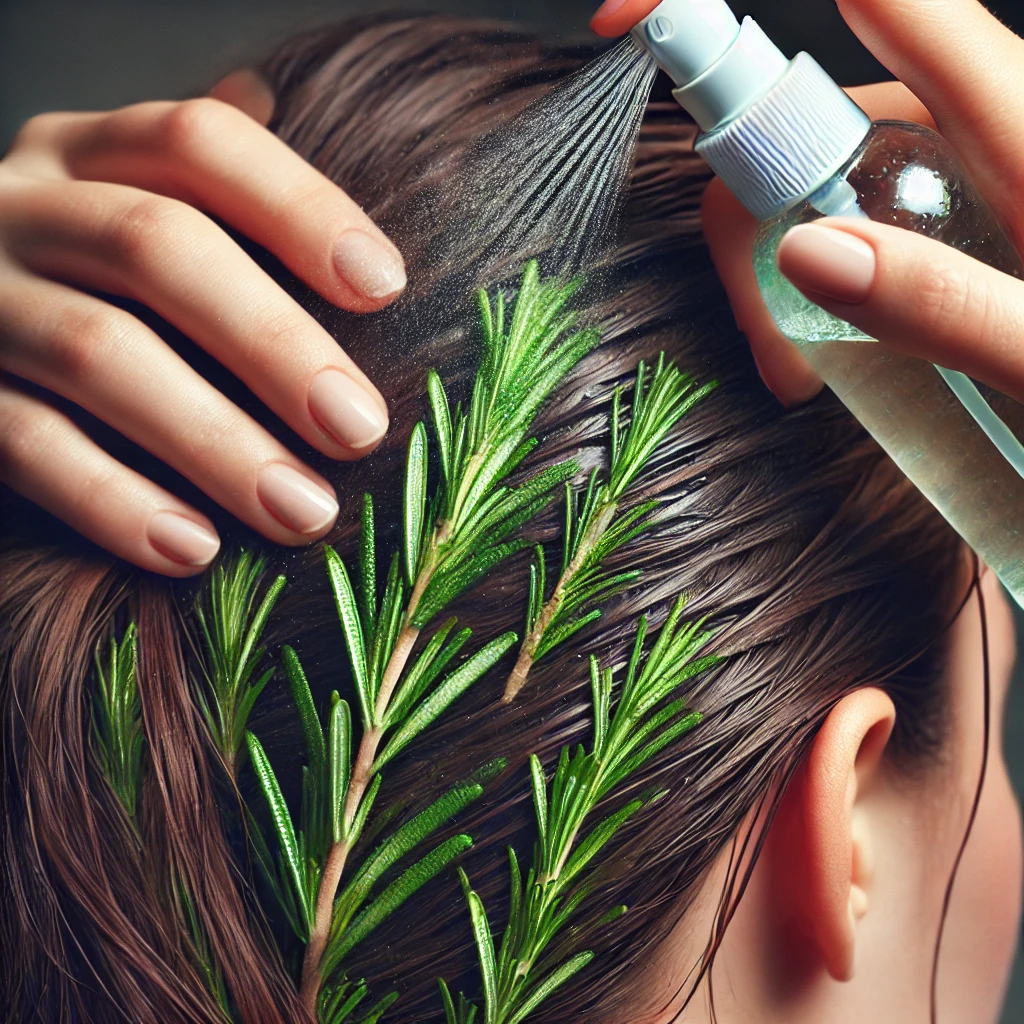
One of the most celebrated uses of rosemary water is its ability to promote hair growth. The herb stimulates blood flow to the scalp, which strengthens hair follicles and encourages the growth of thicker, healthier strands.
How to Use it for Hair Growth
- Massage rosemary water directly into your scalp before rinsing.
- Use it as a leave-in spray on damp hair after showering.
- Combine it with essential oils like peppermint or tea tree oil for added scalp benefits.
Consistency is key—use rosemary water on your hair 2-3 times a week to see noticeable improvements over time.
8. Rosemary Water for Skin Health
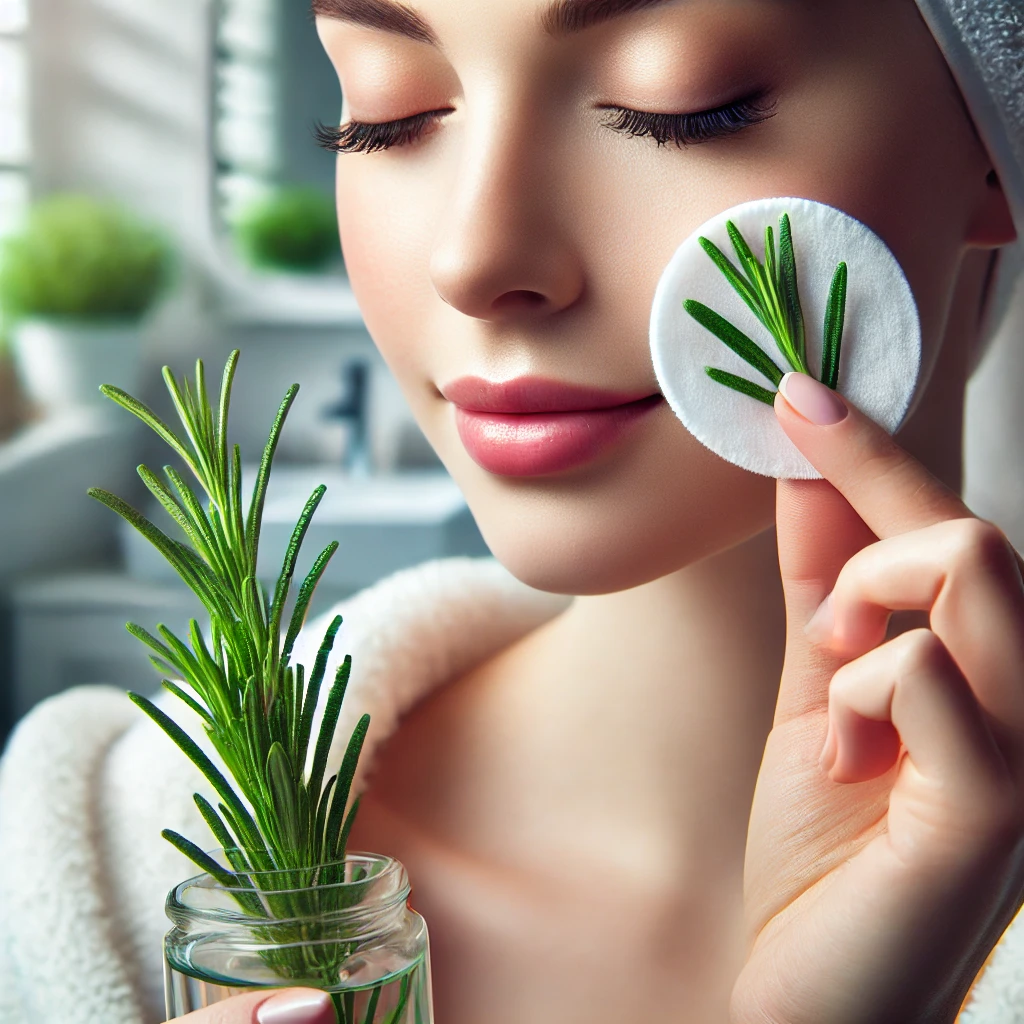
Your skin will love the rejuvenating properties of rosemary water. Its natural antioxidants and anti-inflammatory compounds work wonders for soothing irritation, reducing redness, and fighting acne.
How to Incorporate it into Your Skincare Routine
- Use rosemary water as a facial mist throughout the day to keep your skin hydrated and refreshed.
- Mix it with rose water for a gentle and fragrant DIY toner.
- Add it to your clay masks for an antioxidant-rich boost.
9. Drinking Rosemary Water: Is it Safe?

Drinking rosemary water is not only safe but also highly beneficial when consumed in moderation. Its mild flavor makes it a great base for herbal teas. When consumed, rosemary water can:
- Aid digestion and reduce bloating.
- Support hydration with added nutrients.
- Provide a mild energy boost thanks to its stimulating properties.
However, if you’re pregnant, nursing, or have medical conditions, consult your doctor before consuming rosemary water regularly.
10. Variations of the Recipe

Why not get creative with your rosemary water? Here are some fun variations to try:
- Add Lemon and Honey: For a zesty and sweet twist, perfect for a refreshing drink.
- Infuse with Lavender: Combine rosemary with lavender for a calming aroma and enhanced skincare benefits.
- Green Tea Blend: Add a green tea bag to the boiling water for an antioxidant powerhouse.
Experiment with different combinations to find the one that suits your taste and needs best!
11. Common Mistakes to Avoid
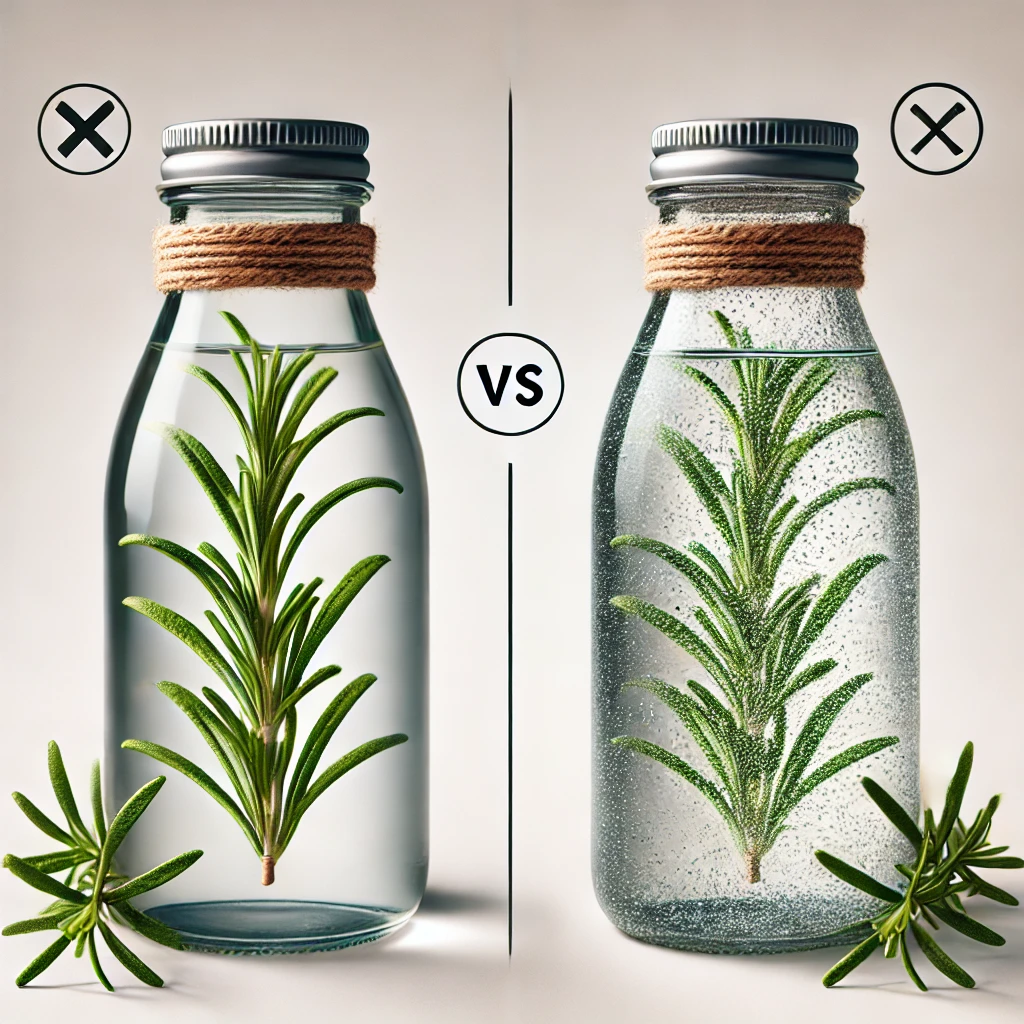
While making rosemary water is simple, there are a few common mistakes that could affect the quality and effectiveness of your infusion. Avoid these pitfalls to ensure you get the most out of your rosemary water:
a. Using Tap Water
Tap water often contains chlorine and other impurities that can interfere with the infusion process. Always opt for filtered or distilled water for the best results.
b. Over-Steeping the Rosemary
Steeping rosemary for too long can result in a bitter flavor and an overpowering aroma. Stick to the recommended steeping time of 15-20 minutes.
c. Storing Improperly
Leaving rosemary water at room temperature or in an unsterilized container can lead to bacterial growth. Always refrigerate your rosemary water and use sterilized bottles.
d. Neglecting a Patch Test
If you’re planning to use rosemary water on your skin or scalp, test it on a small area first to ensure you don’t experience any allergic reactions or irritation.
e. Adding Too Many Ingredients
While experimenting is fun, adding too many ingredients can dilute the benefits of rosemary or cause unwanted reactions. Keep it simple and add only one or two complementary ingredients.
12. The Science Behind Rosemary’s Power

The benefits of rosemary water are not just old wives’ tales—there’s real science backing its effectiveness. Here’s a closer look at why rosemary is such a powerful herb:
a. Rich in Antioxidants
Rosemary contains compounds like rosmarinic acid, caffeic acid, and carnosic acid, all of which are potent antioxidants. These help neutralize free radicals that can damage your hair, skin, and cells.
b. Improves Circulation
Studies have shown that rosemary stimulates blood circulation. When applied to the scalp, this increased blood flow nourishes hair follicles, promoting growth and preventing hair loss.
c. Antimicrobial Properties
Rosemary has natural antimicrobial and antifungal properties, making it effective against dandruff, acne, and other skin irritations caused by bacteria or fungi.
d. Cognitive Boost
The aroma of rosemary has been linked to enhanced memory and concentration. Research suggests that inhaling rosemary’s scent may improve cognitive performance by stimulating neurotransmitters in the brain.
13. DIY Rosemary Water Sprays

Transform your rosemary water into a convenient spray for easy application. Here’s how to make and use these sprays:
Hair Spray
- Pour rosemary water into a spray bottle.
- Mist it onto your scalp and hair roots daily.
- Use it as a leave-in treatment to strengthen your hair and prevent breakage.
Facial Mist
- Combine rosemary water with rose water for a soothing facial spray.
- Spritz it onto your face throughout the day to hydrate and refresh your skin.
Room Freshener
- Mix rosemary water with a few drops of lavender or citrus essential oil.
- Use it as a natural, chemical-free air freshener for your home or car.
14. Rosemary Water vs. Other Herbal Remedies

How does rosemary water compare to other popular herbal remedies? Here’s a quick comparison:
Rosemary Water vs. Chamomile Tea
- Chamomile: Best for soothing and relaxation.
- Rosemary: Ideal for energizing, stimulating, and enhancing focus.
Rosemary Water vs. Mint Infusion
- Mint: Provides a cooling sensation and refreshes the skin and body.
- Rosemary: Offers a warming, invigorating effect and improves circulation.
Rosemary Water vs. Aloe Vera
- Aloe Vera: Hydrates and soothes dry skin and scalp.
- Rosemary: Stimulates and strengthens hair and skin, making it more suitable for those looking to enhance growth and repair.
15. Final Thoughts
Rosemary water is a simple, affordable, and natural way to improve your hair, skin, and overall well-being. Its versatility makes it a must-try for anyone interested in natural remedies. Whether you’re looking to boost hair growth, rejuvenate your skin, or enjoy a refreshing drink, this herb offers a myriad of benefits.
FAQs
1. Can I use rosemary water daily on my hair?
Yes, but it’s recommended to start with 2-3 times a week to observe how your hair responds. Overuse may lead to dryness in some hair types.
2. How long should I leave rosemary water on my hair?
If you’re using it as a rinse, leave it on for 10-15 minutes before rinsing with plain water. For a leave-in treatment, there’s no need to rinse.
3. Can I drink rosemary water every day?
Drinking rosemary water daily is generally safe in moderation. Stick to one cup a day to enjoy its benefits without overloading your system.
4. Is rosemary water safe for sensitive skin?
Rosemary water is gentle but may cause irritation in sensitive skin. Always perform a patch test before using it on your face or scalp.
5. Can I use rosemary water with other hair treatments?
Absolutely! Rosemary water complements most hair treatments. Use it alongside oils, conditioners, or serums to enhance your routine.







1 thought on “The Ultimate Rosemary Water Recipe: Benefits and Uses”